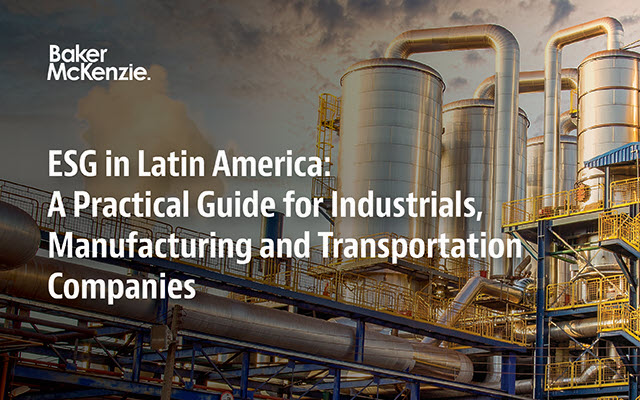Industrials, manufacturing and transportation (IMT) businesses are quickly integrating sustainability, or an environmental, social and governance (ESG) framework into their overall corporate strategy. ESG issues are now considered a corporate imperative due to their practical and business implications, as well as the challenges and opportunities they present. Shareholders, financial institutions, customers, employees and other stakeholders expect sustainability considerations to be incorporated into how companies do business and address these with transparency. It is also becoming clear that sustainability increases the long-term value of a business and facilitates efficiency goals, thereby enhancing shareholder value for IMT companies.
With corporate boards more directly engaged on ESG matters than ever before, they are relying on their legal teams to provide comprehensive legal counsel and mitigate corporate risk.
Baker McKenzie and Trench Rossi Watanabe* produced this guide to identify important themes in corporate sustainability for IMT companies in Latin America and provide key questions and practical considerations when implementing sustainability strategies and initiatives. The guide covers the following jurisdictions: Argentina, Brazil*, Chile, Colombia, Mexico, Peru** and Venezuela.
Guide overview

This guide includes:
- ESG due diligence regulations of suppliers of goods and services
- Carbon credit market
- Sanctions or incentives that affect or contribute to ESG objectives
- R&D and decarbonized hydrogen projects regulations
- Policies, regulations or subsidies for the use of biofuels
- ESG litigation in Latin American countries
Our specialists answer the following key questions set out below:
- Are there regulations and policies regulating mandatory ESG due diligence of suppliers of goods and services produced at or imported into your country?
- How would the EU’s new Deforestation and Forest Regulation potentially impact the jurisdiction?
- Is the carbon credit market regulated in your jurisdiction?
- Are there sanctions or incentives (e.g., tax benefits) for affecting or contributing to ESG objectives (e.g., energy efficiency, waste reduction, efficient use of resources, workforce diversity and inclusion, reduction of plastic pollution, biodiversity, circular economy, land protection or air quality)?
- Are there regulations, policies or subsidies in the jurisdiction for the research and development (R&D) or the structuring of decarbonized hydrogen projects?
- Are there regulations, policies or subsidies related to the gradual insertion of biofuel in your country’s energy matrix?
- What are the main issues raising concerns in ESG litigation in the jurisdiction?
How we can help

|
Sustainability / ESG strategy |
ESG M&A / energy transition investments |
The "Washings" |
ESG and the modern workforce |
|
Carbon markets and climate-related commitments |
Building a more sustainable supply chain |
Packaging and takeback requirements in Latin America |
Arrange a meeting

Baker McKenzie and Trench Rossi Watanabe* are trusted advisors to many of the largest industrials, manufacturing and transportation companies in Latin America and worldwide on their strategic growth initiatives involving ESG, sustainability, supply chains and energy transition solutions.
If you would like to meet with our team of specialists in Latin America, please contact Marcio Polto and Gabriela Diaz.
*Trench Rossi Watanabe and Baker McKenzie have executed a strategic cooperation agreement for consulting on foreign law.
**Please note that Estudio Echecopar has been operating as a fully independent law firm since 1 July 2025.
Contact
-

Raymundo E. Enríquez
Senior Counsel- Mexico City
+ 52 55 5279 2906 Email -

Roberto Grané
Partner- Buenos Aires
+ 54 11 4310 2214 Email -

Mirco Hilgers
Partner- Santiago
+ 56 2 2367 7037 Email -

Santiago Maqueda
Partner- Buenos Aires
+54 11 5776 2351 -

Anahita Thoms LL.M.
Partner- Berlin
+ 49 30 2 20 0 2 81 612 Email -

Camila Jiménez
Associate- Bogota
+ 57 601 634 1555 Email -

Laura Torres Restrepo
Associate- Bogota
+57 601 6341589 Email -

Javiera Velasco Tocornal
Associate- Santiago
+ 562 2367 7069 Email -

Jesús Villegas Ruiz
Partner- Caracas
+ 58 212 276 5147 Email


